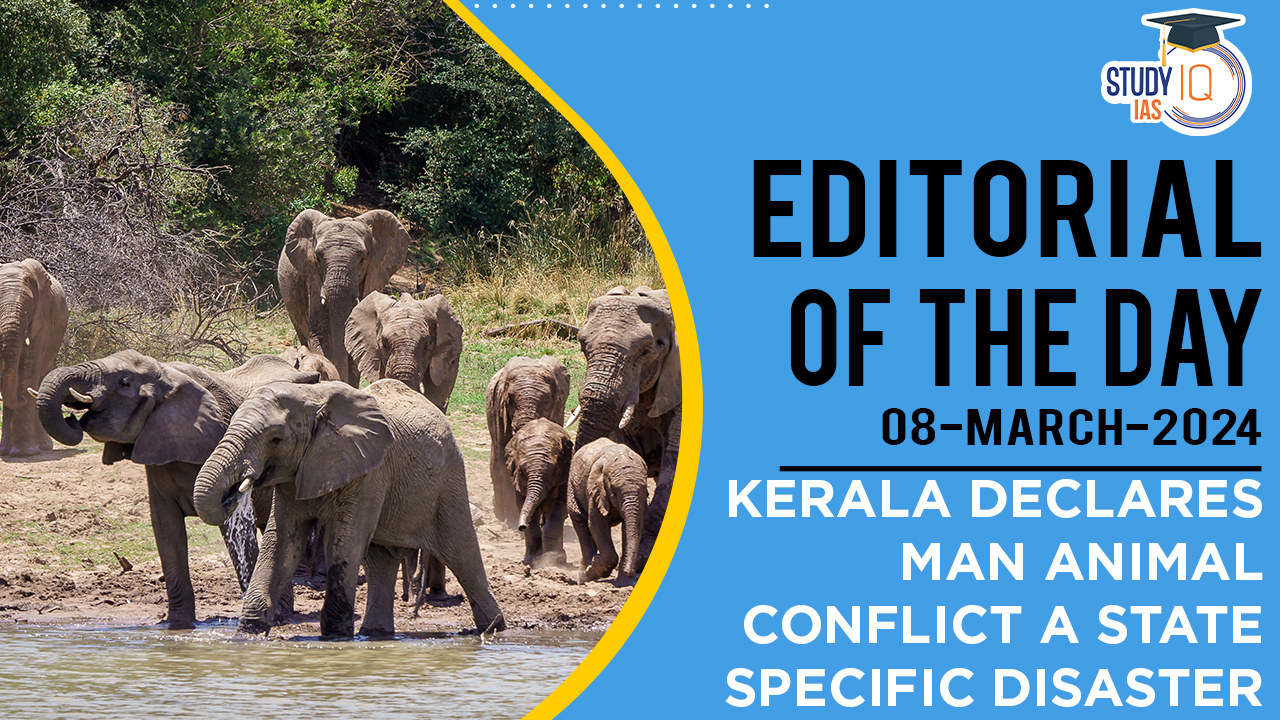Context: The Kerala cabinet declared man-animal conflicts as a state-specific disaster in light of frequent life-threatening encounters, particularly with elephants.
| Fact |
| There have been nine fatalities attributed to man-animal conflicts in Kerala in 2024. |
Resolution Measures
Long-term Measures
- Smart Elephant Fence: Installation of a smart fence to deter wild elephants from entering human habitation areas, aiming to reduce conflicts, particularly in Wayanad.
- Undergrowth Removal in Estates: Clearing undergrowth in private estates to remove potential hiding spots for wildlife. Employment will be guaranteed for workers involved in this task.
- Restoration of Natural Vegetation: This involves the removal of eucalyptus and acacia plantations and supporting the regeneration of native vegetation to enhance wildlife habitats.
- Entry of Private Vehicles: Regulation on the entry of private vehicles into the forest area will be implemented to minimise disturbances to wildlife.
We’re now on WhatsApp. Click to Join
Short-term Measures
- Inter-State Committee Meetings: Coordination between states through committee meetings.
- Command Control Centre: Setting up a Command Control Centre in Wayanad for better conflict management.
- Early Warning System: Strengthening systems to alert residents about the potential presence of wild animals near human settlements.
- Eradication of Senna Plants: Removing invasive senna plants that can disrupt local ecosystems and wildlife movements.
- Fencing and Safety Measures: Erecting fences to prevent the entry of wild animals into areas of human habitation.
- Drone Surveillance: Using drones to monitor wildlife movement and to provide early warnings to residents.
- State Disaster Response Fund (SDRF): A State Government may use up to 10% of the funds available under the SDRF for providing immediate relief to the victims
- Setting up of new protocols: Establishing new measures for tourism and wildlife interaction.
- Eco-tourism Site Disclosure: Regulating eco-tourism destinations to prevent conflict and ensure conservation efforts are maintained.
Four-Level Monitoring System
- State-Level Committee: Headed by the Chief Minister, this top-level committee includes other ministers to address the issue.
- Second-Level Committee: Led by the chief secretary and comprising various department secretaries, including the state Disaster Management authority, to implement statewide directives.
- District Level: District collectors will oversee district-level committees, which include forest officers and medical officials, to execute district-level actions.
- Grassroots Level: Local vigilant committees, led by local civic body presidents, will take preemptive measures following district committee directives.
Reasons for such effort
- The recurring man-animal conflicts highlight a pressing wildlife management challenge in Kerala.
- The site of repeated wild gaur attacks, underscoring the tension between development and wildlife conservation.
- Rising discontent among Kerala’s populace due to dangerous wildlife encounters and the government’s response to them.


 India vs Pakistan T20 World Cup 2026 Liv...
India vs Pakistan T20 World Cup 2026 Liv...
 One Lakh Crore Urban Challenge Fund Appr...
One Lakh Crore Urban Challenge Fund Appr...
 The Administrative Challenge of Scale in...
The Administrative Challenge of Scale in...




















